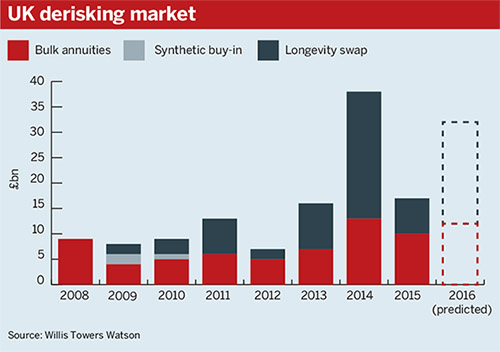The growing number of players in the UK buyout market may, counterintuitively, make it more difficult for pension schemes to get quotations from insurers, industry experts have said.
The number of insurers who have announced a bulk annuity deal in the past 12 months increased to nine in 2015, up from seven in 2014. And there is speculation schemes looking to take advantage of a more competitive market will drive up deal volumes to as high as £20bn, from £11bn last year.
Your odds of winning a deal as a buyer have gone down to one-in-nine; the cost of participating hasn’t changed
Jerome Melcer, PwC
Jerome Melcer, director at consultancy PwC and head of development for its cloud-based pension platform Skyval, said the increased competition in the market would make it more difficult for schemes to get accurate pricing.
He said: “The problem with the buyout market is price visibility. It takes a huge amount of work. Each of the insurers needs to make a lot of effort to get member details, benefit structure, [etc].”
He added: “Your odds of winning a deal as a buyer have gone down to one-in-nine; the cost of participating hasn’t changed.”
UK buyout market: the players
Aviva
Canada Life
Just Retirement*
Legal & General
Partnership*
Pension Insurance Corporation
Prudential
Rothesay Life
Scottish Widows
*Just Retirement and Partnership are awaiting approval from the Prudential Regulatory Authority and the Financial Conduct Authority to merge
Some advisers use their own pricing models for schemes they take to market, which Melcer said can reduce the time taken to provide a quote to five days from six weeks. Experts said a good adviser would prevent schemes falling foul of difficulties with the market.
Fragmented market
Tiziana Perrella, head of buyout at consultancy JLT Employee Benefits, said schemes should consider targeting specific buyout insurers.
"The market is slightly fragmented… rather than going whole-of-market, try to identify which companies are the most suitable and start with a shortlist of maybe three providers," she said.
Another way to reassure insurers, she said, was by using triggers for acceptable pricing. Such triggers are either hard, such as pledging to buy at a certain rate; or soft, such as stating a preferred price.

Estimates from Skyval indicate buyout deal volume could reach £20bn in 2016, but Perrella said that while the number of schemes transacting was likely to go up, the volume of money was harder to call.
“The deal numbers will stay high and will be, probably, higher than last year. All the insurers have got a good appetite for business."
Perrella added that advisers were well-placed to help schemes find a good deal.
The importance of preparation was echoed by Alex Hutton-Mills, managing director for corporate advisers Lincoln Pensions.
He said: “Pension trustees and sponsors are likely to obtain more interest and achieve better pricing on insuring DB benefits by being better prepared for potential buy-in/buyout deals.
"This should cover which insurers they would realistically execute with, and factor in the financial strength of each by reference to the new Solvency II world."
The introduction of Solvency II this month will increase capital requirements for insurers, potentially affecting their risk appetite and the premiums paid by schemes looking to buy out.
However, Hutton-Mills said: “With more competition from new entrants, you would hope for downward pricing pressure in 2016 to offset increases arising from the impact of Solvency II.”

















